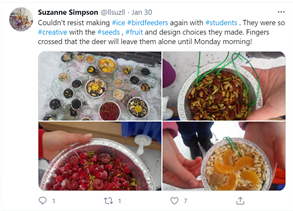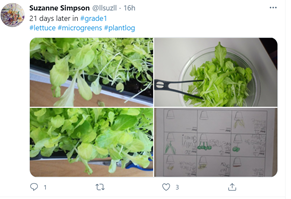Suzanne Simpson - an Eco Innovator
- charlenesacher
- Jan 30, 2021
- 7 min read
Updated: Feb 6, 2021

Suzanne Simpson is currently teaching grade one and two and as a school librarian in a Winnipeg school. I however met her while she was employed for Sage Gardens, a local greenhouse. She has her master’s in education and did her thesis on school gardens in rural, urban, and northern Manitoba. Her link to her thesis can be found here if you are interested in reading more. She is currently working as a school librarian and supporting multiple classes where she can apply her knowledge in technology and horticulture within the classroom. In her own words, she “brings the fun” (Simpson, 2021). Throughout our conversation, she continued to amaze me by her depth of knowledge and her passion for teaching and learning.
I had the opportunity to meet Suzanne through my continued work as the chair of the conference committee through the Manitoba Association of Multiage Educators (MAME). Every October, MAME hosts a conference for 700-900 participants. Four years ago, I received a brochure from Sage Gardens, they were about to start offering sessions for schools and teachers, I quickly booked a session for our upcoming conference. Suzanne has offered multiple sessions for MAME including: the history between vegetable gardens and schools, research-based best practices and common challenges schools face when starting and running a gardening program, local plants from Manitoba that thrive in our climate, local pollinators and curriculum connections, endangered status of the tall grass prairies, design strategies and options for installing a Medicine Wheel garden, introduction to 4 sacred medicines (from a botanical perspective), seed collections, plant propagation techniques, and how to create and maintain a vermicomposter at school. She presented multiple times for MAME both within our conference as well as during professional development sessions that were put on throughout the year in the evenings. This was part of her role as the horticulture support staff for the gardening centre she worked for. While working at Sage Gardens, she also ran a Junior Botanist program, a hands-on learning opportunity that was available in both French and English.
(image 1: brochure for Sage Garden's PD sessions; image 2: photo of variety of seeds during seed saving PD; image 3: photo of teachers listening to session on types of school gardens Photo Credit: Charlene Sacher)
Throughout the first couple of months she was able to continue, in a limited role, to
provide on-line support to first time gardeners. However, as schools remained closed, Suzanne needed to look for other opportunities. Last year she moved back into the classroom and this school year she has gone back to working full time within the school setting in her current role.
Suzanne shares how to start plants in the spring in this CTV news story
I asked her what motivated her to take the steps she took to realize the various accomplishments she has attained. She responded that she just likes to learn and to do; instead of complaining about a problem, she looks for active ways to solve it. “If something is not working, I don’t get stuck on that. I look for other leaders and work with them to solve the problem”. She shared the example of when she first became a teacher, in a classroom without any outside windows. She went from being “a country girl who was often knee-deep in the pond catching frogs to having to connect with city kids without access to even view the outdoors.” She found herself becoming quickly burned out and realized that she needed a solution to feeling more like herself and to find ways to connect with her students. She began to take them outside throughout the day. This had a huge impact, not only for her, but for her students emotionally and academically. She thought that if this is true for her class, perhaps it may be true for others. She then began her research into outdoor education and specifically became interested in gardening and the effects on children and school communities. It was at this point that she began to pursue her masters program and searching for jobs that allowed her to grow in her role of educator, gardener, mentor, and horticultural expert.
Challenges to be overcome
As we discussed barriers that she has needed to overcome, she shared that she is coming from a place of privilege as she is white and grew up in a middle-class home that was supportive. She also shared how throughout her childhood she was often a victim of bullying and this was formative to her ability to connect with others and with nature. She knew the importance of connection and relationship due to her childhood experience and strives to work towards creating this with her own interactions with others.
She shared that a large barrier that she has faced is how society tends to view educators as well as gardening. Both these roles are not highly valued, despite being essential to our society. Schools are significantly underfunded and often do not have the funds for the types of horticulture that would benefit students. This resulted in her not being paid a professional wage based on her immense wealth of knowledge as gardening is just seen as an “add -on or a hobby for old women”, not a valuable skill. Within schools, she faced barriers such as lack of time, lack of support from administration, and other staff members seeing time with nature and gardening as a waste of time and resources. Suzanne shared how excited she now is to be a teacher librarian as this “allows for flexibility and collaborative co-teaching through inquiry-based learning”.
(Images of various school gardens from Wix Photo Library)
Tips to foster creativity and innovation
When asked what recommendations she had for fostering more creativity, innovation, or entrepreneurship within schools she shared this advice:
· Sometimes just bring the fun – get messy and explore.
We need to continue to learn - follow innovative educators online, take courses in something you are interested in, listen to podcasts, spend time learning because you are addicted to learning not because you must.
Surround yourself with people who are excited about learning and are positive. There are always naysayers but often they too will come around once they see some successes.
Start small and add to it.
Celebrate the community – appreciate everyone’s role – that way you still have a committee.
Look for a supportive administrator.
Specifically for gardening or outdoor education – try to make yourself financially dependent that way you do not always have to rely on grants and whatever the school can scrape together
Inspiring others
Suzanne continues to contribute to the social, cultural, and environmental health of her school community in her role as teacher librarian. She builds community by bringing her expertise and enthusiasm to the classroom and by bringing students outside to engage with nature. When asked what her goals as an educator are, she answered that she wants to, “equip kids to be connected with the world around them. With the growing need to address climate change, it is important for children to have a strong connection with nature. This way they will see the sacrifices that they will need to make as necessary and worthwhile.” She creates community and shares her knowledge with children and encourages them to be innovative in their own thinking.
She also continues to inspire me through our conversations and through her professional development sessions she offers. I have been able to implement some of her teachings into my classroom, particularly those around vermicomposting. We created one habitat for the class and our worms loved it so much that they just kept laying more eggs and our worm population exploded. Our classroom then went around to the school and surveyed each class if they wanted to have a vermicomposter of their own. They drilled and glued to create another 9 composters and created videos and posters to share how to care for the worms and how to harvest the castings. Now we have vermicomposters in most classrooms and even some of the students have created composters at home. All of this because of Suzanne and her presentation on vermicomposting as she shared on how easy it was, this gave me the confidence and the push I needed to try. She builds this confidence in both teachers and students alike as she shares her passion and knowledge for gardening within the school setting. She is an inspiration to me and so many other educators.
(Photos of Suzanne teaching about vermicomposting and bottom left photos of the vermicomposters in my classroom. Photo credit: Charlene Sacher and Suzanne Simpson)
She continues to teach and inspire others through her social media feed, where she continually shares innovative, sustainable, and creative hands-on teaching lessons. Suzanne encourages teachers to consider starting a salad club at school using veggies that they grow themselves in their indoor garden. “I can come in and teach them how to start it up. You sow the seeds with the students once a month and it takes 28 days to get a crop of micro-greens. It’s really amazing how you can get such a variety of flavours at such a small stage. So every 28 days, you harvest this crop and you enjoy a little classroom salad together. Everyone shares. They’re eating greens and vegetables. They’re learning about the plant parts and the seeds and the stages of growth. You do it every month, so it becomes part of your classroom routine and a little bit of a celebration too." (McFee, 2019). She is able to continue doing this within her classroom even with the current restrictions. She builds this confidence in both teachers and students alike as she shares her passion and knowledge for gardening within the school setting. She is an inspiration to me and so many other educators.
Suzanne's Twitter Feed (@llsuzll)
References
McFee, J. (2019, September 04). Growing minds & Other Sprouts. Retrieved February 06, 2021, from https://www.mbteach.org/mtscms/2019/02/27/growing-minds-other-sprouts/
Simpson, S. (2017). Country garden, city garden: Elementary school gardens in rural, urban and northern Manitoba. Retrieved January 20, 2021, from https://mspace.lib.umanitoba.ca/handle/1993/32612
Simpson, S. (2020, April 8). Plant Propagating 101 [Interview by 1181710026 884773804 N. Dube]. Retrieved February 6, 2021, from https://winnipeg.ctvnews.ca/video?clipId=1935964&binId=1.1206882&playlistPageNum=1&fbclid=IwAR0mvtv4Vg_7deTjXaU3ya_H3Moi7zGq6PpVoIyVlfmjeuyDpOwOyty7nxk
Simpson, S. (2021, January 19). Interview with an Innovative Educator [Telephone interview].
























Comments